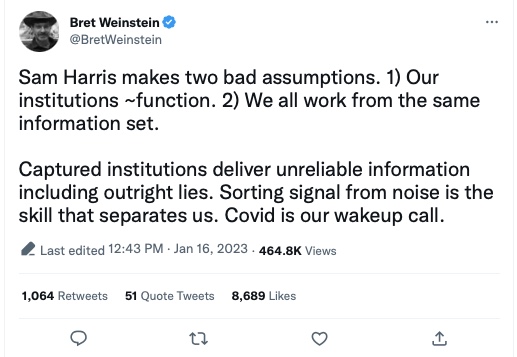This is an excerpt from article by highly regarded Stanford Researcher, Dr. Jay Bhattacharya, whose account was shut down by Twitter, recently restored. An excerpt:
About a year later, after historian Phil Magness made a FOIA request, I learned a part of the story of how the U.S. government-sponsored propaganda campaign against the GBD came into being. Four days after we wrote the GBD, Francis Collins, the geneticist and lab scientist who was then the head of the U.S. National Institutes of Health, wrote an email to Anthony Fauci, the immunologist and lab scientist who is the head of the National Institute of Allergy and Infectious Diseases. In the email, Collins called Martin, Sunetra, and me “fringe epidemiologists” and called for a devastating public takedown. The attacks on the three of us, aided by the cooperation of supposedly private social media platforms like Twitter, were launched shortly after Collins sent that email.
But this is not an article about the ethics of social media companies whose profits depend to a large extent on the friendliness of government regulators and whose employees may see themselves as partisan political activists. This is a critique of our best universities, which are supposed to be dedicated to the pursuit of knowledge—yet which turn out to be no different than government propagandists and private corporations in their self-seeking, amoral behavior.
. . . .
Stanford failed to meet the higher standard of positive academic freedom, which would have required it to promote an environment where faculty members engage with each other respectfully despite fierce disagreement.
. . . .
The irony in this idea of “science” as a set of sacred doctrines and beliefs is that the Age of Enlightenment, which gave us our modern definitions of scientific methodology, was a reaction against a religious clerisy that claimed for itself the sole ability to distinguish truth from untruth. The COVID-19 pandemic has apparently brought us full circle, with a public health clerisy having replaced the religious one as the singular source of unassailable truth.
The analogy goes further, unfortunately. The same priests of public health that have the authority to distinguish heresy from orthodoxy also cast out heretics, just like the medieval Catholic Church did. Top universities, like Stanford, where I have been both student and professor since 1986, are supposed to protect against such orthodoxies, creating a safe space for scientists to think and to test their ideas. Sadly, Stanford has failed in this crucial aspect of its mission, as I can attest from personal experience.
The title to the article: "How Stanford Failed the Academic Freedom Test: For America’s new clerisy, scientific debate is a danger to be suppressed."

